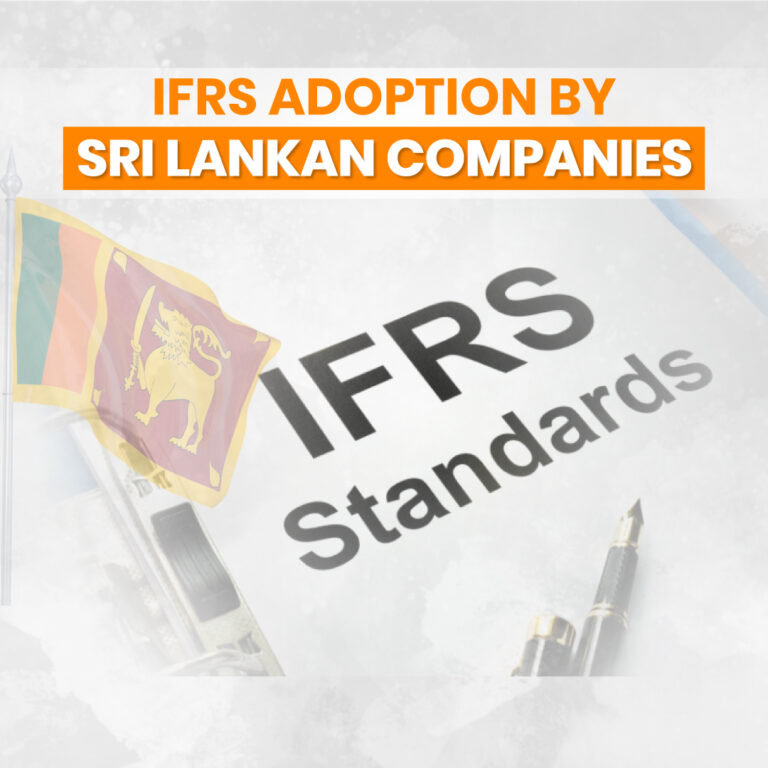“Towards Transparency: Challenges and Compliance in Sri Lanka’s IFRS Journey”
IFRS adoption in Sri Lanka is no longer a choice for companies but a mandatory practice to run their business with transparency. From January 2012, Sri Lanka has revised its accounting standards equivalent to the International Financial Reporting Standards (IFRS) for the public sector; this standard is known as SLFRSs. The SMEs in Sri Lanka follow the SLASSE, whereas companies & large firms follow SLAS; it has become a mandatory regulation for businesses in Sri Lanka.
The IFRS Adoption in Sri Lanka was taken quite seriously and has been followed strictly ever since; this has had a very positive effect on improving financial reporting quality as well as boosting corporate governance. Following IFRS ensures that the organization is well-aligned with global financial reporting standards, making the firm eligible to collaborate with international businesses and is effective in business expansion. Want to know the challenges faced by Sri Lankan companies in adopting IFRS and how they comply with it? You can explore it with the help of this comprehensive guide.
CHALLENGES FACED DURING THE IFRS ADOPTION IN SRI LANKA:
Below are the top-listed, most common challenges faced by Sri Lankan companies during IFRS adoption in Sri Lanka:
- Not many professionals are trained with technical competencies and have knowledge gaps, because of which they are not able to get clarity about IFRS implications.
- Accountants, auditors, and finance professionals need to get extensive training sessions and human capacity to be proficient in IFRS adoption in Sri Lanka.
- Usually, firms, especially SMEs, lack the cost of implementation, for example, the cost needed for system updates, training, etc.
- Inconsistency or misalignment of regulatory, institutional, or regional frameworks with one another might cause unwanted disruptions.
- Areas like revenue recognition, classification of financial instruments, etc, of IFRS require better judgement; whereas, in Sri Lanka, complexity or lack of interpretation could be the issue faced by professionals.
- It can be quite challenging sometimes for finance professionals to keep up with the frequent updates or changes made in IFRS.
IFRS ADOPTION IN SRI LANKA: INSIGHTS ABOUT COMPLIANCE
Let’s dive in to find out how well the Sri Lankan companies are doing in adopting IFRS. Here are some meaningful insights on the matter:
- Undoubtedly, numerous big organisations, especially the publicly listed companies, are making progress as more disclosures are seen in their annual reports. These companies are especially from the banking, power, or insurance sector, and are highly focused on aligning their reports with SLFRS requirements.
- But, it is still observed that companies vary in compliance as some concentrate on all requirements, while others overlook one over another and vice versa, resulting in variations.
- Auditors or Regulators dealing with SMEs usually struggle with the enforcement of mechanisms.
RECOMMENDATIONS TO IMPROVE THE IFRS ADOPTION IN SRI LANKA:
Here are some effective measures that you can take to ensure Sri Lankan companies and professionals are efficiently adopting IFRS.
- Increased opportunities to train and educate professionals regarding IFRS.
- Sri Lanka should set a strict standard or build a strong regulatory support.
- It is recommended to actively invest in technology, systems, and process improvement for better outcomes.
- To overcome the financial challenges or burden, companies should enforce strong cost management strategies, such as using pooled resources, etc.
- It is vital to take stakeholders and investors on board; hence, it is essential to spread IFRS awareness amongst them.
- It is effective to monitor and take feedback to find the loops and start working on them.
CONCLUSION:
IFRS adoption in Sri Lanka is indeed essential to keep its financial sector relevant in the global financial world. There are many benefits of actively adopting IFRS in Sri Lanka, including bringing international investors into the region. Companies can grow internationally only if they follow IFRS standards strictly. Looking at all the advantages, it no longer remained an option for companies in Sri Lanka, but this became a mandatory regulation for companies to follow and comply with IFRS requirements. As of today’s date, companies in Sri Lanka must adopt IFRS for efficient reporting practices.
FREQUENTLY ASKED QUESTIONS (FAQs)
Q1: What is the impact of IFRS on Sri Lankan financial statements?
Ans: Following IFRS for creating Sri Lankan financial statements can be quite beneficial, as it can improve transparency, increase investors’ confidence, improve reporting quality, etc.
Q2: Who is the responsible body/organization for implementing SLFRS in Sri Lanka?
Ans: The responsible body behind issuing and implementing SLFRS in Sri Lanka is the ‘Institute of Chartered Accountants of Sri Lanka’.
Q3: Why is it challenging for SMEs to implement IFRS in Sri Lanka?
Ans: The primary reasons why SMEs find it difficult to incorporate IFRS in Sri Lanka are a lack of resources, expertise/ knowledge, and infrastructure.





